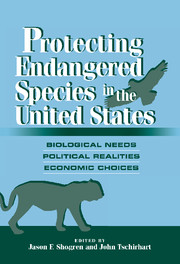 Protecting Endangered Species in the United States
Protecting Endangered Species in the United States Book contents
- Frontmatter
- Contents
- About the Authors
- Acknowledgments
- Foreword
- 1 The Nature of Endangered Species Protection
- PART 1 BIOLOGICAL NEEDS
- PART 2 POLITICAL REALITIES
- 6 Interest Group Behavior and Endangered Species Protection
- 7 Beyond Cute and Fuzzy: Science and Politics in the U.S. Endangered Species Act
- 8 Community Politics and Endangered Species Protection
- 9 On Political Realities: Comments on Ando, Cash, and Meyer
- Replies by Authors
- PART 3 ECONOMIC CHOICES
- PART 4 SUMMARY AND DATABASE
- Index
9 - On Political Realities: Comments on Ando, Cash, and Meyer
Published online by Cambridge University Press: 06 July 2010
- Frontmatter
- Contents
- About the Authors
- Acknowledgments
- Foreword
- 1 The Nature of Endangered Species Protection
- PART 1 BIOLOGICAL NEEDS
- PART 2 POLITICAL REALITIES
- 6 Interest Group Behavior and Endangered Species Protection
- 7 Beyond Cute and Fuzzy: Science and Politics in the U.S. Endangered Species Act
- 8 Community Politics and Endangered Species Protection
- 9 On Political Realities: Comments on Ando, Cash, and Meyer
- Replies by Authors
- PART 3 ECONOMIC CHOICES
- PART 4 SUMMARY AND DATABASE
- Index
Summary
INTRODUCTION
Stephen Meyer, David Cash, and Amy Whritenour Ando make a strong case in Chapters 6 through 8 in this volume for the importance politics and interest group behavior play in the implementation of the ESA of 1973 (ESA). Each of these chapters addresses the relative role of science, economics, and politics on the implementation of the ESA. Although each of the authors agrees that politics has an impact on ESA implementation, the authors have varying opinions on the relative importance of politics compared to the other factors.
The conclusions drawn by the authors are diverse. Meyer suggests that science “can never be the dominant force in endangered species protection because other factors, broadly subsumed in the term ‘polities’, will ultimately determine which lands are included or excluded in a habitat recovery plan.”
Cash reaches a different conclusion: “It seems that scientific variables have greater explanatory power for the listing decision than do the nonscientific considerations.” Cash does not completely discount the impact of politics on ESA implementation. When it comes to funding the ESA, he concludes (p. 131) “funding is not wholly consistent with FWS [Fish and Wildlife Service] guidelines, and particularly with its science-based components.”
Ando reaches a conclusion similar to Cash: both politics and science matter. She concludes that: “Species that rank high in the listing-priority system (science based) do tend to be proposed for listing relatively quickly. … However, the results also show that interest groups do influence the agency's listing process.”
- Type
- Chapter
- Information
- Protecting Endangered Species in the United StatesBiological Needs, Political Realities, Economic Choices, pp. 166 - 172Publisher: Cambridge University PressPrint publication year: 2001


